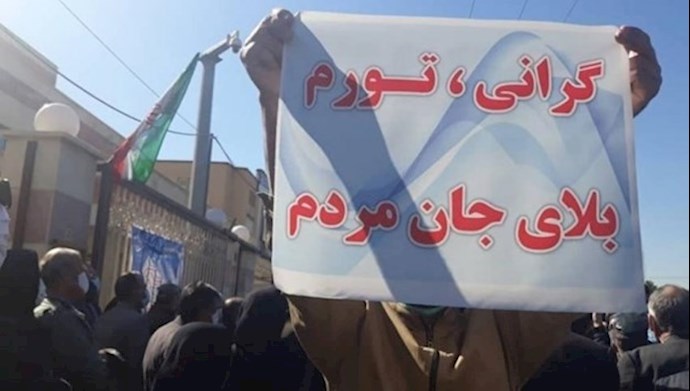Analysis by PMOI/MEK
Iran, May 11, 2021—Since the mullahs seized power in Iran after the 1979 revolution, the country has been on a path of negative growth and economic decline. The regime plundered the nation’s wealth and resources, and plundered industrial production and growth, all to further its own evil goals. Today, Iran’s economy is controlled by what has become known as the “Power and Wealth Mafia,” a network of regime institutions and their affiliates who have made a fortune at the expense of the Iranian people. While the mafia enjoys great wealth and luxurious lives, the majority of Iran’s population lives in utter poverty, a situation that has only become worse during the covid-19 outbreak and the regime’s disregard for the pandemic’s effect on the people’s lives and the country’s economy.
33-percent decline in per-capita income
“While according to the Central Bank, the country’s per-capita income in 2019 decreased by nearly 33 percent in comparison to 2011, with the outbreak of the Covid-19 in 2020, the country’s economy faced a new shock,” the Tasnim news agency reported on January 19, 2021.
The state-backed media acknowledge that, even if the regime manages to sell oil and natural resources in 2021, it will not have a serious impact on people’s lives, especially on the lives of the lower and poorer classes.
On March 30, Tejarat daily reported, “The country’s economic growth is forecast to be positive in 2021… but due to the lack of serious impact on employment, the people’s living conditions are unlikely to change much.”
Uncertainty even with possible nuclear deal
All positive forecasts are predicated on the Iranian regime reaching an agreement in negotiations with world powers on its nuclear program. Otherwise, the economy will be in a state of uncertainty and can bring economic growth close to zero and even in the negative range. This dark perspective, of course, has been clarified by the Parliamentary Research Center, which reported on May 5: “Recommendation to the expansion budget to get out of the recession has nothing to do with the Iranian economy’s current situation. Because the risk of hyperinflation is not so far, and if the 2021 budget is based on unrealistic sources, the country’s economy will face high inflation and more instability in various markets.”
How did the economy reach this point?
In such economic conditions, factions within the regime try to lay the blame on their rivals, thinking that they will escape the political consequences of this dangerous situation.
On March 15, Abbas Abdi, an analyst with ties to the so-called “reformist” current, wrote on the Etemad daily, “For 40 years, the slogan of cutting the economy’s dependence on oil has been advertised. What was the result? In the previous government, where hardliners ruled everything, they took hundreds of billions of dollars in oil revenues and coordinated their consumption, and with it, the government and increased its dependence on oil. But they could not increase employment by as much as even one or two percent. Finally, in just one decade, the country’s monetary value has decreased 25 times.”
In their rivalries, the regime’s factions even blame each other for international sanctions.
“Sanctions against Iran were able to show the devastating effects of previous irrational and populist policies, and this was the most important achievement of these sanctions. But will we learn from this experience? Unfortunately, the answer is no,” Abdi added.
Zero economic growth
On May 15, Ebtekar daily reported: “To better express the meaning, we can examine some economic numbers and data: First: Iran’s economic growth in the last 10 years has averaged zero percent! Anywhere else in the world, this statement would cause a great deal of concern and would be the basis for fundamental changes in the approach of economic policymakers, but many in Iran today do not see it. The lack of economic growth in the past 10-year period is not an alarm but a danger in itself.
“Second, the formation of fixed capital and the depreciation curve intersected in 2020. This means that not only is there no investment in the country, but we are also facing a severe outflow of capital and, to put it more simply, we are not building the future of the country.”
People are very dissatisfied with their empty tables
On May 5, Saeed Mohammad, the former commander of the Khatam‑al Anbiya Construction Headquarters, the largest economic holding of the Revolutionary Guards, who has nominated himself for the presidency, wrote in a letter to all candidates: “The people are tired and angry of the current situation, their empty tables, and the inefficiency and corruption of the rulers of the Islamic Republic, and want a great change in the style of governing.”
In the letter, Mohammad stressed that “people are tired of factionalism, hypocrisy, discrimination, and injustice of political and economic aristocracy, of unkept promises, and of hearing the daily news of corruption cases.”
It is worth noting that the Khatam Al-Anbiya Garrison, which Mohammad directed for many years, is itself one of the major sources of economic corruption in the country. So, while Mohammad’s words are notable, the bigger takeaway is that the fact that he, with all his corrupt history, has nominated himself for presidency tells a lot about the kind of people who wish to run the country.
Now that the situation in the country is deteriorating, he has realized that “problems, backwardness, and inefficiencies … have led to a decrease in public confidence in the leaders and managers of the Islamic government.” And the regime officials are accused because of this situation, and “inactions and mismanagement are real and cannot be denied.”
Of course, the people will eventually respond to all this corruption and inefficiency in their own way, by boycotting the regime’s elections and casting their vote with their protests and uprisings.





